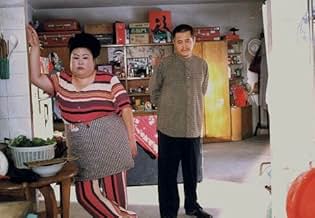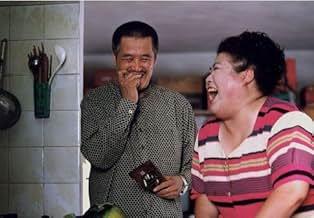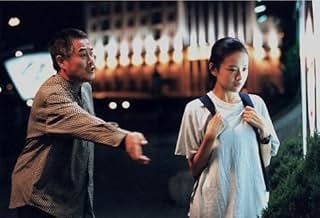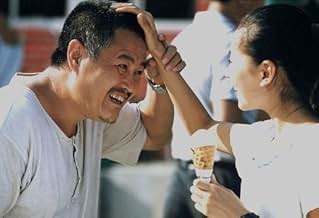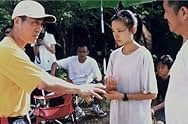NOTE IMDb
7,3/10
4,3 k
MA NOTE
Ajouter une intrigue dans votre langueAn aging bachelor has to engage his old, laid-off friends to keep a blind girl happy as a masseuse at a non-existent massage parlor.An aging bachelor has to engage his old, laid-off friends to keep a blind girl happy as a masseuse at a non-existent massage parlor.An aging bachelor has to engage his old, laid-off friends to keep a blind girl happy as a masseuse at a non-existent massage parlor.
- Réalisation
- Scénario
- Casting principal
- Récompenses
- 5 victoires et 4 nominations au total
Avis à la une
There is no doubt in my mind that Zhang Yimou is one of the world's finest film makers. He manages to straddle the bounds of both art house and commercialism with his catalogue of works that show a beauty and grandeur that often earns the description "painterly", whilst also telling a really good story. Happy Times is something of a departure from works like Raise The Lantern and Shanghai Triad, being a fairly realist comedy.
Happy Times ("Happy Times Hotel" on the print) is about a group of 'retired' (laid off) factory workers who conspire to hoax a young blind girl. Not as callous as it sounds though, as their intentions are relatively good. The main characters are a 50 year old bachelor (Zhao Benshan) and the blind girl herself, played by newcomer Dong Jie. A small crowd of interesting friends and the gargantuan love interest/stepmother of the leads pad out the cast, which mostly plays out in a couple of small locations - two cramped flats, a sprawling abandoned warehouse, and a delapidated bus.
It's very much a character piece, focussing mainly on the relationship that develops between Zhao Benshan and Dong Jie, thrust together under circumstances that neither planned. It's a tender story... a little bit happy, a little bit sad. Bittersweet I guess, but only slightly bitter.
Zhang Yimou forgoes his usual luscious cinematography for quite a naturalistic feel. Apparently he used "hidden cameras" to shoot some of it, but I've no idea what that means (maybe the street scenes?). It's quite a simple piece, a light 95 minutes long, yet still crafted with the dexterity and care that Zhang Yimou always brings to a film. Being a character piece, it is very much dependent on the performances for success - Zhang could coax an oscar winner out of a mannequin, but Dong Jie here is especially good. If I hadn't seen her walking around the theatre unattended, I would certainly have believed she was genuinely blind (this is not an easy thing to act), and her emotional expression is spot on too. You couldn't possibly not care for her character, or that of Zhao Benshan.
The movie might be quite 'slight' in Zhang Yimou's filmography - it's unlikely to win any oscars for him, but it is a nicely made movie that I think everybody can enjoy.
Happy Times ("Happy Times Hotel" on the print) is about a group of 'retired' (laid off) factory workers who conspire to hoax a young blind girl. Not as callous as it sounds though, as their intentions are relatively good. The main characters are a 50 year old bachelor (Zhao Benshan) and the blind girl herself, played by newcomer Dong Jie. A small crowd of interesting friends and the gargantuan love interest/stepmother of the leads pad out the cast, which mostly plays out in a couple of small locations - two cramped flats, a sprawling abandoned warehouse, and a delapidated bus.
It's very much a character piece, focussing mainly on the relationship that develops between Zhao Benshan and Dong Jie, thrust together under circumstances that neither planned. It's a tender story... a little bit happy, a little bit sad. Bittersweet I guess, but only slightly bitter.
Zhang Yimou forgoes his usual luscious cinematography for quite a naturalistic feel. Apparently he used "hidden cameras" to shoot some of it, but I've no idea what that means (maybe the street scenes?). It's quite a simple piece, a light 95 minutes long, yet still crafted with the dexterity and care that Zhang Yimou always brings to a film. Being a character piece, it is very much dependent on the performances for success - Zhang could coax an oscar winner out of a mannequin, but Dong Jie here is especially good. If I hadn't seen her walking around the theatre unattended, I would certainly have believed she was genuinely blind (this is not an easy thing to act), and her emotional expression is spot on too. You couldn't possibly not care for her character, or that of Zhao Benshan.
The movie might be quite 'slight' in Zhang Yimou's filmography - it's unlikely to win any oscars for him, but it is a nicely made movie that I think everybody can enjoy.
Yimau Zhang takes us along for a ride to explore how things seem to have changed in China. The country has given a step forward into the modern age as it shakes off its rigid past, adopting new ways in doing things. In fact, the country appears to have developed its own take on capitalism, as we watch a new prosperous, and aggressive China, transformed in ways we had not envisioned before. Mr. Zhang's film is an allegory about his country.
The main idea in the film is how Zhao, a factory worker, sets his eyes on a plump and attractive woman to get married. The woman, in turn, has her own ideas of what to expect from this man who lies to her and makes himself pass for a hotel manager. Thinking this is the case, the lady friend proposes he employs her stepdaughter, a blind girl that has been abandoned by her father, who has decamped to another city.
Zhao, who wants to keep the girlfriend happy, decides to take Wu Ying to work at his hotel, which in reality is a bus, that he and his buddy have converted in a lovers' motel, in a park. But before he can do anything, Zhao watches in horror as how some cleaning crews are taking his livelihood away because they are beautifying the area. Zhao is stuck with Wu Ying, so he takes her to his own humble apartment.
Zhao and his friends from the factory devise a plan to convert space in the dilapidated building a massage parlor so that the blind girl can work. The only thing, there are no clients, and only Zhao's friends are enrolled to tip the young woman using Zhao's own money.
The film is a delightful comedy about how being entrepreneurial backfires on the well intentioned man. The blind girl, Wu Ying, knows much more than what Zhao and the rest give her credit for, and unfortunately, everything ends badly, except for the blind girl, who recognizes the kindness of his mentor, who doesn't get to know first hand of her gratitude because fate intervenes.
"Happy Times" is a charming film that works thanks to the light touch by the director. Benshan Zhao, who has been seen in other Chinese films is excellent in the role of Zhao. Jie Dong plays Wu Ying with conviction and Lifan Dong, is the stepmother, who discovers the duplicity of her would be husband.
Recommended to all Yimou Zhang's fans who might have missed its commercial run.
The main idea in the film is how Zhao, a factory worker, sets his eyes on a plump and attractive woman to get married. The woman, in turn, has her own ideas of what to expect from this man who lies to her and makes himself pass for a hotel manager. Thinking this is the case, the lady friend proposes he employs her stepdaughter, a blind girl that has been abandoned by her father, who has decamped to another city.
Zhao, who wants to keep the girlfriend happy, decides to take Wu Ying to work at his hotel, which in reality is a bus, that he and his buddy have converted in a lovers' motel, in a park. But before he can do anything, Zhao watches in horror as how some cleaning crews are taking his livelihood away because they are beautifying the area. Zhao is stuck with Wu Ying, so he takes her to his own humble apartment.
Zhao and his friends from the factory devise a plan to convert space in the dilapidated building a massage parlor so that the blind girl can work. The only thing, there are no clients, and only Zhao's friends are enrolled to tip the young woman using Zhao's own money.
The film is a delightful comedy about how being entrepreneurial backfires on the well intentioned man. The blind girl, Wu Ying, knows much more than what Zhao and the rest give her credit for, and unfortunately, everything ends badly, except for the blind girl, who recognizes the kindness of his mentor, who doesn't get to know first hand of her gratitude because fate intervenes.
"Happy Times" is a charming film that works thanks to the light touch by the director. Benshan Zhao, who has been seen in other Chinese films is excellent in the role of Zhao. Jie Dong plays Wu Ying with conviction and Lifan Dong, is the stepmother, who discovers the duplicity of her would be husband.
Recommended to all Yimou Zhang's fans who might have missed its commercial run.
This is one of the most touching films I've ever seen. I actually don't think I can find the words in English to describe how wonderfully director Zhang Yimou seems to understand the finer points of human emotions. I was absolutely touched with Happy Times, and consequently sought out his work, "The Road Home", which I found was equally excellent.
I wanted to wait to write a review of this film until I felt I could compose something fitting, but realized for me, the comments must come from the heart. In short, I'd rather skip any attempt to summarize the film or intellectually categorize it into some literal form that doesn't really fit. It is slowly immersing into unselfish love for another, while relating a sense of light comedy. My recommendation is that you try to see it on IFC or one of the other Independent film channels when it's available.
On Golden Pond is the only American film I can think of that evokes the same level of emotion provoked by Zhang Yimou.
I wanted to wait to write a review of this film until I felt I could compose something fitting, but realized for me, the comments must come from the heart. In short, I'd rather skip any attempt to summarize the film or intellectually categorize it into some literal form that doesn't really fit. It is slowly immersing into unselfish love for another, while relating a sense of light comedy. My recommendation is that you try to see it on IFC or one of the other Independent film channels when it's available.
On Golden Pond is the only American film I can think of that evokes the same level of emotion provoked by Zhang Yimou.
10dsulpy
It seems that most of the negative reviews that this film has gotten are based upon people's misconception that the film should be what THEY want it to be, not what it really is. The truth is, although there's certainly humor in the film, it's not a comedy - nor does it pretend to be a fairy tale, or a social expose, or a political statement. To me, it's a film about cruelty and compassion - both by human beings and by fate. I found it both life-affirming, and heartbreaking - often at the same time, and I thought the acting was excellent on everyone's part. To me, well worth seeing, and quite unique.
This film will either get to you like a death in the family, or leave no lasting impression on you whatsoever. I'm among those who fit in with the first part. Maybe family death is exaggerating but that doesn't matter, this is still A VERY POWERFUL FILM. This film proves that ZHANG YIMOU IS THE BEST DIRECTOR ALIVE (as Alferd Hitchcock and Akira Kurosawa are dead). The best actor in this film is actually the blind girl (sure, she's no River Pheonix, but who is?) who always gives you the impression that she's blind (unlike some American actors in American films). Yet she happens to know more than you think in the end (no spoilers on that). To see this film on the big screen was too much, 10 out of 10. Oh, and watch out for Hero, from the same director of this.
Le saviez-vous
- AnecdotesDirector Zhang Yimou issued a casting call via the Internet for role of the blind girl. Eventual lead Dong Jie was selected from some 40,000 girls who auditioned for the role.
- Versions alternativesSPOILER: There are two cuts of this film; the original Chinese Theatrical Cut and an International Cut, which is six minutes longer. The International Cut features more content in the early scenes when the two couples come to the Happy Times Hut hoping to have sex. In the Chinese cut, these scenes are more ambiguous as to what the couples have in mind. Additionally, the International Cut has a longer and very different conclusion. In the Chinese cut, after Zhao (Benshan Zhao) writes the letter supposedly from Ying's father, the film cuts to him reading it to her as the credits start to role. In the International Cut, however, after Zhao leaves the restaurant in which he writes the letter, he is hit by a car. In hospital, his friends come to see him, finding the letter to Ying (Jie Dong). Upon returning to her apartment, however, they find it deserted. A tape recording Ying has made and left behind explains that she knew all along the Happy Times Hotel didn't exist, but she didn't mind as they were the happiest days of her life. She then explains that she is going to Shenzhen. After the message is finished, Fu (Biao Fu) plays it again, reading aloud Zhao's letter at the same time. The film then cuts to Ying walking along a crowded city street as the credits role.
- ConnexionsFeatured in Late Night with Conan O'Brien: Martin Lawrence/Los Lobos (2002)
Meilleurs choix
Connectez-vous pour évaluer et suivre la liste de favoris afin de recevoir des recommandations personnalisées
- How long is Happy Times?Alimenté par Alexa
Détails
- Date de sortie
- Pays d’origine
- Sites officiels
- Langue
- Aussi connu sous le nom de
- Happy Time
- Lieux de tournage
- Sociétés de production
- Voir plus de crédits d'entreprise sur IMDbPro
Box-office
- Budget
- 1 900 000 $US (estimé)
- Montant brut aux États-Unis et au Canada
- 240 093 $US
- Week-end de sortie aux États-Unis et au Canada
- 31 084 $US
- 28 juil. 2002
- Montant brut mondial
- 361 000 $US
- Durée1 heure 42 minutes
- Couleur
- Mixage
- Rapport de forme
- 1.78 : 1
Contribuer à cette page
Suggérer une modification ou ajouter du contenu manquant








